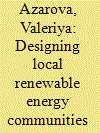|
|
|
Sort Order |
|
|
|
Items / Page
|
|
|
|
|
|
|
| Srl | Item |
| 1 |
ID:
166986


|
|
|
|
|
| Summary/Abstract |
Resistance of the local population to new energy infrastructure may hinder achieving the European Union's goal that 32% of energy consumption come from renewable sources. A vast literature is available on the social acceptance of specific renewable energy technologies, but existing research lacks assessments regarding comprehensive transformations to local energy systems. Moreover, the promising energy storage technology power-to-gas has not yet been addressed in acceptance studies. This paper fills these gaps by analysing data from a choice experiment survey with 2000 respondents across four nations (Germany, Austria, Italy, and Switzerland). Results from the analysis show that solar farms and power-to-gas infrastructure increase acceptance of local energy communities, while wind farms have an ambiguous effect, and gas power plants and power lines decrease acceptance. The derived monthly willingness to pay estimates for the acceptance-increasing technologies ranges from 8.5€ for power-to-gas to 29.5€ for photovoltaics. Additionally, we investigate whether stated support from political opinion leaders at the local, national, and EU levels can increase the acceptance of renewable energy systems. Results suggest that Italian choices are influenced by the opinions of EU and national governmental bodies (+3.5% and +2.7%), and that Swiss choices are sensitive to the opinions of local politicians (+2.3%).
|
|
|
|
|
|
|
|
|
|
|
|
|
|
|
|
| 2 |
ID:
186416


|
|
|
|
|
| Summary/Abstract |
Hydrogen is a promising supplement in future energy systems with high penetration rates of renewable energy (RE) generation. As conversion technology between the two secondary energy carriers, hydrogen and electricity, particularly grid-connected electrolysers, have a role to play. During the market ramp-up, grid-connected electrolysers could cause unwanted side-effects through inducing additional CO2 emissions in the power sector. Since the reduction of CO2 constitutes the overall goal, a simultaneity obligation between RE generation and hydrogen production is discussed to prevent indirect emissions from an electrolyser's energy consumption. The paper presents a model framework including a mixed-integer linear program and a Markov chain Monte Carlo simulation for stochastic electricity prices to assess a grid-connected electrolyser's dispatch. Within a case study of the German electricity market, the effect of simultaneity on the dispatch is assessed. The results show that simultaneity reduces the CO2 emission intensity of hydrogen while constraining profits. The choice of the simultaneity interval length affects the electrolyser's average contribution margin from hydrogen production and the corresponding profit at risk, which results from fluctuating RE generation. Regulations aiming at the interface between hydrogen and electricity must consider the trade-off between economic viability, full load hours, and associated emissions of electricity-based hydrogen.
|
|
|
|
|
|
|
|
|
|
|
|
|
|
|
|
|
|
|
|
|